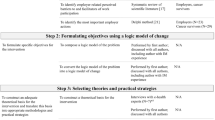Abstract
Purpose Despite the growing importance of cancer and return-to-work issues in occupational rehabilitation literature in the last decade, academic discussion is largely limited to survivors’ perspectives and some exploratory studies from the employer side. This paper applies two classic theoretical models—Theory of Planned Behavior and Social Cognitive Theory—and key measures from previous studies to identify explicit relationships that explain employer factors to hire and retain cancer survivors. Methods Data were collected from online surveys with senior management executives and senior human resource specialists from various organizations in Singapore, with a total of 145 responses. The 72-item survey instrument included a series of independent variables: (1) Attitudes toward cancer and cancer survivors; (2) Employers’ efficacy; (3) Perceived moral obligation; (4) Employers’ experience; (5) Outcome expectations; (6) Employment situation; (7) Social norms; and (8) Incentives, and dependent variables: (a) Employers’ intention to hire cancer survivors; and (b) Employers’ intention to retain cancer survivors. Results Regression analyses showed that the top three factors related to employers’ intention to retain cancer survivors are perceived moral obligations (β = .39, p < .001), followed by attitudes toward cancer (β = .25, p < .01), and employment situation (β = .17, p < .05). Employers’ efficacy was associated with intention to hire (β = .22, p < .05), coupled with attitude toward cancer survivors (β = .22, p < .01). The findings also indicated the important role of existing relationship between an employer and an employee when it comes to retaining cancer survivors and government incentives for hiring cancer survivors in the workforce. Conclusions The present study provided an avenue to implement the proposed model—a potential study framework for the management of cancer survivors at work. Findings revealed that different messages should be tailored to employers toward hiring and retention issues and provided useful guidelines for employer education materials.



Similar content being viewed by others
References
Peteet P. Cancer and the meaning of work. Gen Hosp Psychiatry. 2000;22:200–5.
Amir Z, Neary D, Luker K. Cancer survivors’ views of work 3 years post diagnosis: a UK perspective. Eur J Oncol Nurs. 2008;12:190–7.
Gusani NJ, Schubart JR, Wise J, et al. Cancer survivorship: a new challenge for surgical and medical oncologists. J Gen Intern Med. 2009;24:456–8.
Pinquart M, Frohlich C, Silbereisen RK. Optimism, pessimism and the change in psychological well-being in cancer patients. Psycho Health Med. 2007;12:421–32.
Voogt E, van der Heide A, van Leeuwen AF, et al. Positive and negative affect after diagnosis of advanced cancer. Psycho-Oncol. 2005;14:262–73.
Bradley CJ, Bednarek HL. Employment patterns of long-term cancer survivors. Psycho-Oncol. 2002;11:188–98.
Amir Z, Strauser D, Chan F. Employers’ and survivors’ perspectives. In: Feuerstein M, editor. Work and cancer survivors. New York: Springer; 2009. p. 73–89.
Chan F, Strauser D, Maher P, Lee E-J, Jones R, Johnson ET. Demand-side factors related to employment of people with disabilities: a survey of employers in the Midwest region of the United States. J Occup Rehabil. 2010;20:412–9.
Grunfeld EA, Rixon L, Eaton E, Cooper AF. The organizational perspective on the return to work of employees following treatment for cancer. J Occup Rehabil. 2008;18:381–8.
Mehnert A, de Boer A, Feuerstein M. Employment challenges for cancer survivors. Cancer. 2013;119:2151–59.
Mehnert A. Employment and work-related issues in cancer survivors. Crit Rev Oncol Hematol. 2011;77:109–30.
Feuerstein M, Todd B, Moskowitz M, et al. Work in cancer survivors: a model for practice and research. J Cancer Surviv. 2010;4:415–37.
Ajzen I. The theory of planned behavior. Org Behav Human Decis Processes. 1991;50:179–211.
Bandura A. Social cognitive theory: an agentic perspective. Annu Rev Psychol. 2001;52:1–26.
Singapore Department of Statistics [database from the Internet]. Key annual indicators; 2011. [cited 26 Sep 2011]. Available from: http://www.singstat.gov.sg/stats/keyind.html#demoind.
Singapore Ministry of Health [database from the Internet]. Health financing – what others said to us; 2007. [cited 26 Sep 2011]. Available from: http://www.moh.gov.sg/mohcorp/hcsystem.aspx?id=22966.
International Finance Corporation [database on the Internet]. The World Bank: Economy rankings; 2010 [cited 26 Jan 2011]. Available from: http://www.doingbusiness.org/economyrankings/.
Mak AKY. Toward an occupational rehabilitation policy community for cancer survivors in Singapore: a stakeholder perspective from the SME employers. J Occup Rehabil. 2011;21:77–85.
Roche J. [database on the Internet]. Singapore: corporate, social & responsible but no corporate social responsibility; 2000 [cited 8 Oct 2008]. Available from: http://www.mhcinternational.com/corporate-social-responsibility/publications/singapore.
Singapore Health Promotion Board [database from the Internet]. What are chronic diseases? 2009. [cited 26 Sep 2011]. Available from http://www.hpb.gov.sg/chronicdiseases/article.aspx?id=3396.
Singapore Ministry of Community Development, Youth and Sports [database from the Internet]. Enabling master plan 2007–2011: definition of disability and the prevalence rate of persons with disabilities in Singapore; 2007. [cited from 26 Sep 2011]. Available from http://www.mcys.gov.sg/enablingmasterplan/report/EM_Chapter1.pdf.
Mak AKY, Chaidaroon S, Fang G, Thalib F. Unintended consequences: The social context of cancer survivors and work. J Can Surviv. 2014. doi:10.1007/s11764-013-0330-6.
Schmidt WC. World-wide web survey research: benefits, potential problems, and solutions. Behav Res Methods Instrum Comput. 2007;29:274–9.
Granello DH, Wheaton JE. Online data collection: strategies for research. J Counsel Devel. 2004;82:387–94.
Gorsuch RL, Ortberg J. Moral obligation and attitudes: their relation to behavioural intentions. J Pers Soc Psychol. 1983;44:1025–8.
Bouknight R, Bradley C, Luo Z. Correlates of return to work for breast cancer survivors. J Clin Oncol. 2006;24:345–52.
Amir Z, Wynn P, Chan F, Strauser D, Whitaker S, Luker K. Return to work after cancer in the UK: attitudes and experiences of line managers. J Occup Rehabil. 2010;20:435–42.
Acknowledgments
We thank Colleen Chua, Joyce Leong, Rosalinda Yapit, Philemon Foo, Lim Pei Yi and Irwin Tan for their invaluable contributions to the study. This work was supported via the Singapore Cancer Society grant 2010.
Conflict of interest
The authors declared no conflicts of interest with respect to the authorship and/or publication of this article.
Author information
Authors and Affiliations
Corresponding author
Rights and permissions
About this article
Cite this article
Mak, A.K.Y., Ho, S.S. & Kim, H.J. Factors Related to Employers’ Intent to Hire, Retain and Accommodate Cancer Survivors: The Singapore Perspective. J Occup Rehabil 24, 725–731 (2014). https://doi.org/10.1007/s10926-014-9503-z
Published:
Issue Date:
DOI: https://doi.org/10.1007/s10926-014-9503-z



